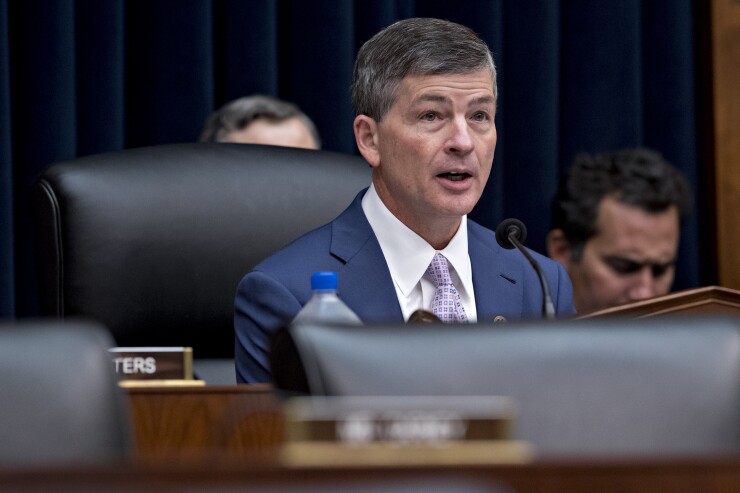WASHINGTON – The House is expected to take up a slightly modified Financial CHOICE Act during the week of June 5 that would no longer repeal a limit on credit card company fees, which may make the bill more palatable to some legislators.
The scheduling of the bill designed by House Financial Services chair Rep. Jeb Hensarling, R-Texas, as a replacement for the Dodd-Frank Act was announced in a House notice. The House Rules Committee has set a June 2 deadline for amendments to the controversial proposal that Democrats have taken to calling the “Wrong CHOICE Act.”
The current CHOICE Act, which is a revised version of a bill Hensarling introduced during the last congressional session, cleared the House Financial Services Committee earlier this month with a 34 to 24 party line vote.
The act contains several provisions specifically related to the municipal market as well as others that would affect the Securities and Exchange Commission and thus munis more broadly.

The bill is expected to meet strong resistance from Democrats in the House and could also see pushback from some Republicans. However, Hensarling’s recent removal of a provision that would have eliminated Dodd-Frank’s Durbin Amendment means there is one less hurdle to overcome when the House takes up the proposal.
The Durbin Amendment was a provision added to Dodd-Frank to limit the fees that credit card companies could charge retailers. The debate over repealing the amendment had pitted banks against retailers and led to significant pressure on legislators, according to sources who had watched the proposal’s legislative movement. The repeal of the Durbin Amendment is expected to play into Republicans’ decision about whether to support the bill in the House.
While the CHOICE Act may pass the House, it would face much stiffer resistance in the Senate, where 60 senators would have to support moving forward with it. There are enough Democrats in the Senate to ensure that threshold isn’t reached, sources said, making it likely that the CHOICE Act would be pieced out into separate provisions that may garner more support on their own.
The act in its current form would require that the SEC’s Office of Municipal Securities begin reporting to the SEC’s Division of Trading and Markets instead of directly to the SEC chair. It would also reallocate to the Treasury Department the money from Securities and Exchange Commission and the FInancial Industry Regulatory Authority fines that the Municipal Securities Rulemaking Board receives from enforcement actions over violations of its rules.
The revised CHOICE Act keeps a provision from the previous version that makes clear municipal issuers aren't required to have a municipal advisor. The provision is tied to a previous bill from Rep. Randy Hultgren, R-Ill., that responded to concerns his office had after hearing that issuers were being told they had to hire MAs under the SEC’s MA Rule.
Another portion of the draft CHOICE Act lays out considerations that agencies like the SEC must take into account when analyzing proposed rulemakings. Among other things, the SEC would have to include: an identification of the need for the regulation and the regulatory objective; an analysis of the adverse impacts regulated entities and other market participants could experience; and a quantitative and qualitative assessment of all anticipated direct and indirect costs as well as benefits of the regulation. The draft legislation further explains similar requirements for notices of final rules.
The new act would also require the SEC to conduct a regulatory impact analysis on each of its rules within five years of their publication in the Federal Register. It would require that the SEC do a retrospective review of its existing rules within one year of the act’s enactment and then every five years thereafter. The SEC would have a year from the date the legislation is enacted to submit a report detailing a plan to subject the MSRB to the CHOICE Act’s regulatory analysis requirements.
It would additionally create an advisory committee on the SEC’s enforcement policies and practices. The SEC chair would have six months after the legislation is enacted to establish such a committee, which would be assigned to analyze the commission’s enforcement policies and procedures, and determine how closely those procedures are being followed, among other things. The SEC would also have to appoint an enforcement ombudsman within 180 days of the act’s enactment and allow the SEC to triple monetary fines in administrative and civil actions where penalties are tied to illegal profits as well as in enforcement cases dealing with repeat violators of laws and rules.
Individuals would be allowed under the rule to force the commission to end an SEC administrative action that has been brought and instead have the matter brought as a civil judicial action.





